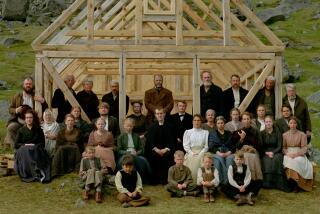Hungarian History, Told With a Gritty ‘Glamour’
- Share via
“Glamour” is a curious title for this film, which, like the earlier “Sunshine,” views the tumultuous events of Hungary in the 20th century through the saga of several generations of a Jewish family. The two pictures are, however, markedly different in tone.
Istvan Szabo’s is a traditional, straightforward account, occasionally ponderous but mainly impressive, while here writer-director Frigyes Godros has spun an elegant, poetic fable of endurance. This often jaunty, droll movie takes an absurdist tone toward the dire twists of fate to which Hungary was subjected over the decades.
“Glamour” is the riskier, more venturesome film, and ultimately is more satisfying in its breezy yet deeply felt originality, a worthy selection as Hungary’s official Oscar entry.
As rain brings a flourish of frogs, the bearded, Orthodox patriarch (Gyorgy Barko) of a Budapest furniture manufacturing family, predicts, in the aftermath of World War I, an ominous future for Hungary. He and his family live in tasteful, spacious comfort above their classy showroom, where they sell fine quality reproductions of period pieces. The brief Red Terror that follows the Great War, a foreshadowing of what will befall Hungary in the wake of World War II, finds the store stripped of its stock, which is returned once the communist threat subsides.
By the ‘30s, the patriarch’s dashing elder son (Karoly Eperjes) has taken charge of the business and has become convinced the family needs an infusion of new blood. A matchmaker presents him with a photo of a pretty German nursery school teacher (Eszter Onodi), and when the two meet it is love at first sight. Because Hungary has an alliance with Germany, and the Third Reich prohibits marriage between Gentiles and Jews, the couple can get around the Nazi decrees only by the teacher first becoming a divorced woman. So for three months she becomes the wife in name only of the family firm’s dutiful upholsterer.
With the advent of World War II, the family, its employees and servants simply retreat to the basement, where the shop, with its copper bell hanging over its door, emerges increasingly as a refuge in a world gone mad--and which would grow even madder with the advent of communist rule. Godros deftly reveals the horrors of the Stalinist era--paranoia, cruelty, even the torture of priests. At its heart, “Glamour” is a paean to the sanctity and strength of the family, and a love story (with the patriarch’s son and his German wife remaining passionately devoted to each other through every adversity).
Highly romantic in its lush imagery (accompanied by a waltzing score), “Glamour” unfolds through the eyes of the patriarch’s grandson (Jonas Togay, in his adolescent years; Miklos Lang, in his 30s), who today would be about 65. This beguiling, unpredictable film climaxes with the grandson imagining his parents, alone and dancing on a large, baroque carousel. In this inspired image, Godros evokes the eternal cycle of life with a shimmering beauty that makes his film’s title seem appropriate after all.
* Unrated. Times guidelines: language, adult themes and situations.
‘Glamour’
Karoly Eperjes: Father
Eszter Onodi: Mother
Gyorgy Barko: Grandfather
Jonas Togay: Son, in adolescence
Miklos Lang: Son, in adulthood
A Bunyik Entertainment release of a Magyar Televizio, Focusfilm (Hungary)/Ilona Grundman Filmproduktion/Arts & Future Film Fabrik (Germany)/Cascadefilm (Switzerland) co-production. Writer-director Frigyes Godros. Producers Kornel Sipos, Ilona Grundman and Gerald W. Kruse. Cinematographer Sandor Kardos. Editor Maria Rigo. Music Laszlo Melis. Costumes Janos Breckl. Art director Gyula Pauer.. In Hungarian, with English subtitles. Running time: 1 hour, 54 minutes.
Exclusively at the Music Hall, 9036 Wilshire Blvd., Beverly Hills. (310) 274-6869.
More to Read
Only good movies
Get the Indie Focus newsletter, Mark Olsen's weekly guide to the world of cinema.
You may occasionally receive promotional content from the Los Angeles Times.










